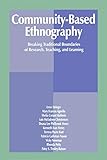Community based ethnography: breaking traditional boundaries of research, teaching, and learning
Material type: TextPublication details: Psychology Press 2018 New YorkDescription: xi, 215 pISBN:
TextPublication details: Psychology Press 2018 New YorkDescription: xi, 215 pISBN: - 9780815349778
- 305.8 S8C6
| Item type | Current library | Collection | Call number | Status | Date due | Barcode | Item holds | |
|---|---|---|---|---|---|---|---|---|
 Book
Book
|
Ahmedabad | Non-fiction | 305.8 S8C6 (Browse shelf(Opens below)) | Available | 197578 |
Browsing Ahmedabad shelves, Collection: Non-fiction Close shelf browser (Hides shelf browser)
Table of Contents:
Reinterpreting teaching / Ernie Stringer
Teaching community-based ethnography / Ernie Stringer
Community building in small groups / Kenneth Ivan Henry
Philosophical and pedagogical development: an ethnographic process / Lois McFadyen Christensen
Everything is different now: surviving ethnographic research / Rhonda Petty
The impact of group interactions on meaning-making: learning qualitative research methodology / Patricia Gathman Nason
An illuminative account of personal-professional conflict: loss, redefinition, and re-emergence of self in the process of ethnographic research / Mary Frances Agnello
Reaching consensus and writing collaborative accounts / Deana Lee Philbrook Henry
Community ethnography: reproduction and resistance in writing the collaborative text / Vicky Newman
High-school students' participation in action research: an ongoing learning process / Shelia Conant Baldwin
Digital distance education: qualitative research in a corporate context / Patsy S. Tinsley-Batson
A learning journey (in progress): a personal biographical ethnography / Terresa Payne Katt
Teaching reinterpreted / Ernie Stringer
Appendix: Syllabus of qualitative research for educators.
Co-written by a professor and 10 students, this book explores their attempts to come to grips with fundamental issues related to writing narrative accounts purporting to represent aspects of people's lives. The fundamental project, around which their explorations in writing textual accounts turned, derived from the editor's initial ethnographic question: "Tell me about the [previous] class we did together?" This proved to be a particularly rich exercise, bringing into the arena all of the problems related to choice of data, analysis of data, the structure of the account, the stance of the author, tense, and case, the adequacy of the account, and more.
As participants shared versions of their accounts and struggled to analyze the wealth of data they had accumulated in the previous classes -- the products of in-class practice of observation and interview -- they became aware of the ephemeral nature of narrative accounts. Reality, as written in textual form, cannot capture the immense depth, breadth, and complexity of an actual lived experience and can only be an incomplete representation that derives from the interpretive imagination of the author.
The final chapter results from a number of discussions during which each contributing author briefly revisited the text and -- through dialogue with others and/or the editor -- identified the elements that would provide an overall framework that represents "the big message" of the book. In this way, the contributors attempted to provide a conceptual context that would indicate ways in which their private experiences could be seen to be relevant to the broader public arenas in which education and research is engaged. In its entirety, the book presents an interpretive study of teaching and learning. It provides a multi-voiced account that reveals how problematic, turning-point experiences in a university class are perceived, organized, constructed, and given meaning by a group of interacting individuals.
(https://www.taylorfrancis.com/books/e/9781317778943)
There are no comments on this title.








